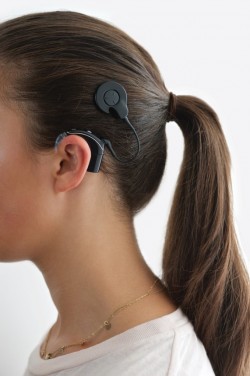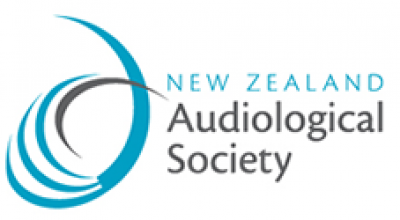What is a Cochlear Implant?
 A cochlear implant is a surgically implanted electronic device that provides the sensation of sound for people with severe and profound hearing loss.
A cochlear implant is a surgically implanted electronic device that provides the sensation of sound for people with severe and profound hearing loss.
How does a Cochlear Implant work?
There are two parts to a cochlear implant system:
1. The implant (inside the body)
2. The Speech Processor (outside the body)
The implant is placed just under the skin behind the ear by an Ear, Nose and Throat surgeon. The implant has an array of electrodes that are placed inside the cochlea by the surgeon.
The Speech Processor converts speech and environmental sound into a digital signal and sends it across the skin to the implant. The electrodes on the implant stimulate the cochlea’s auditory (hearing) nerve fibres, and the auditory nerve carries the signal to the brain. The brain then interprets the signal as sound.
All Speech Processors have a transmitting coil that sends the signal to the implant. The coil sits over the implant package and is held in place by magnetic attraction between the internal and external magnets.
Some Speech Processors have two parts – the battery and processor sit behind the ear and connect to the coil via a cable. Other Speech Processors have the processor, battery and coil all in one unit.
The Specialist Team
An Ear, Nose and Throat Specialist performs the surgery.
An Audiologist programs the Speech Processor to give the recipient access to sound.
A Habilitationist (for children) or Rehabilitationist (for adults) works with the recipient and their family to help the recipient learn to understand the new sound.
It takes time and practice for cochlear implant recipients to learn to listen with their cochlear implant.
Who is a Candidate for Cochlear Implantation?
Children and adults can benefit from Cochlear Implants.
A comprehensive assessment with an Audiologist, Habilitationist / Rehabilitationist and an Ear, Nose and Throat Specialist is required to determine candidacy.
An Audiologist, Advisor on Deaf Children (AoDC) or Ear, Nose and Throat Specialist (Otorhinolaryngologist) can refer a patient to one of the Cochlear Implant Programmes for candidacy assessment.
Funding for Cochlear Implants
The Ministry of Health provides funding for children and adults through the Northern Cochlear Implant Programme and the Southern Cochlear Implant Programme.
If a hearing loss is the result of an accident or injury, ACC may provide funding for a cochlear implant.
Some recipients fund their cochlear implant(s) themselves.
How can I find out more?
For more information contact your local Audiologist, or talk to your Ear, Nose and Throat Specialist, or Advisor on Deaf Children.
More Information About Cochlear Implants for Adults
The Pindrop Foundation has a Cochlear Implant Toolkit available as an educational resource for health professionals and potential cochlear implant recipients. The toolkit includes:
- video interviews and webinars with surgeons, researchers, and CI users.
- overview of how CI technology works
- guidelines and advice on eligibility and referral
- information on CI surgery, including a video of CI surgery
- client stories
The toolkit has resources to guide you on the complete cochlear implant process and pathway.

